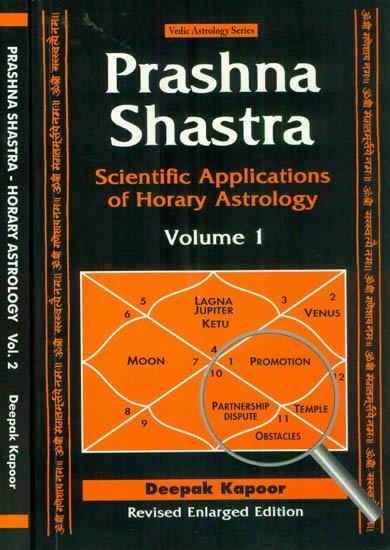Prashna Shastra
author: Deepak Kapoor
edition: 2016, Vinita Kapoor
pages: 490
ISBN-10: 8190104705
Topic: Jyotisha
Preface
Various experts have tried to convey the meaning and purpose of astrology in very rich and diversified ways. There seems to be no purpose to know the future happening in advance unless the outcome of events are related to the righteous thought and conduct. The effect of good or bad karmas on our future life or lives ultimately has a bearing on our present day thought processes, which if understood and communicated properly to the consulting community, can make this world a happier place to live. This is possible by not only understanding the very purpose of human sojourn but also by altering the way we conduct ourselves in society. For this, one has to understand that happiness in life depends not so much on material possessions and environment but human relations and conduct. Character, which may have a different meaning for different people, suffers on account of six enemies which overcome the rational discrimination of a man. These are jealousy, arrogance, lust, anger, desire and greed.
The purpose of astrology, therefore can be summed up to provide counselling so that a person does not indulge in evil deeds and follows the righteous path of dharma. The suffering of any human being is due to the continuance of worldly journey which can be terminated by avoiding the path of evils called adharma. Astrology serves the purpose of bringing out these virtues which are inherent in all human beings.
In this attempt, various author of our classical texts of astrology in general and those relating to prashna in particular have chosen to withhold their names out of sheer humility and dedicated their works to the supreme lord. Take the case of Prashna Marg written in 1649 AD by a namboodri brahmin whose real name is not known. Similarly Krishniya shastra is considered to have been written earlier to Prashna Marg, as many references of Krishneeyam have been quoted in Prashna Marg. The author of Krishneeyam is also not known. Dashadhyayee the commentary on 10 chapters of Varaha Mihir’s great classical work Brihat Jatak was probably written about 100 years earlier to Prashna Marg. These were the chapters which are relevant to Prashna. This work has held in such high esteem that it was published as Nauka ‘the boat’ without which it is difficult to cross this vast ocean of astrology. Its last version was published by Shri Venkateshwara Press in 1912 and has been out of print thereafter. The author of Dashadhyayee also did not reveal his name due to the humility and modesty which were the hallmarks of those great men who contributed to this vast knowledge in such a grandiose measure.
All these observations and wealth of knowledge got assimilated, tested and treasured in various forms. Then came the era invasions in which this great wealth was devastated. Take the of Nalanda, renowned for assimilation of knowledge. It is said that during invasions when the library of Nalanda University was burnt, the books kept on burning for over six months. That was the extent and enormity of loss of knowledge and our ancient scriptures. It was the knowledge accumulated and assimilated over a period of several hundred years and deatroyed in a jiffy. As far as the astrological knowledge is concerned, it is said that there was a time when fifty million shlokas or sutras were available, which today are mere half a million.
From the times of advent of astrology emerged this very useful branch of specialisation called prashna. For all those whose birth details are not known and especially for the specific queries of immediate importance the chart cast for that moment show immense promise as if revealing the mysteries of the unknown future through a magnifying glass. This naturally resulted in its widespread use and merit.
Several generations have contributed in their own humble way to the present wealth of knowledge available to us today which our generation will pass on to the posterity after adding our bit. It has been sacred tradition to distribute this knowledge and teach astrology to the one who is worthy of receiving it, called a supatra. Any knowledge increases in its content and depth if it is shared freely. The contribution of our generation will become possible only if the newer knowledge is not kept confined to themselves by researchers and eminent astrologers. Research in prashna has been a difficult area for two reasons. Firstly mass testing of principles or hypotheses leading to principles is not as easy as in birth horoscopes for the lack of specific charts. Secondly the feed back from the consulting community is generally lacking due to secrecy as well as distance by which the querist is separated from the astrologer. Nowadays consultations do take place over phone, fax or e-mail also.
In spite of the above mentioned observations which at times are depressing or elating, it is satisfying to note that the renaissance of astrological awareness awareness which this era is witnessing indicates that the promise of the growth of astrology is real and not an illusion
